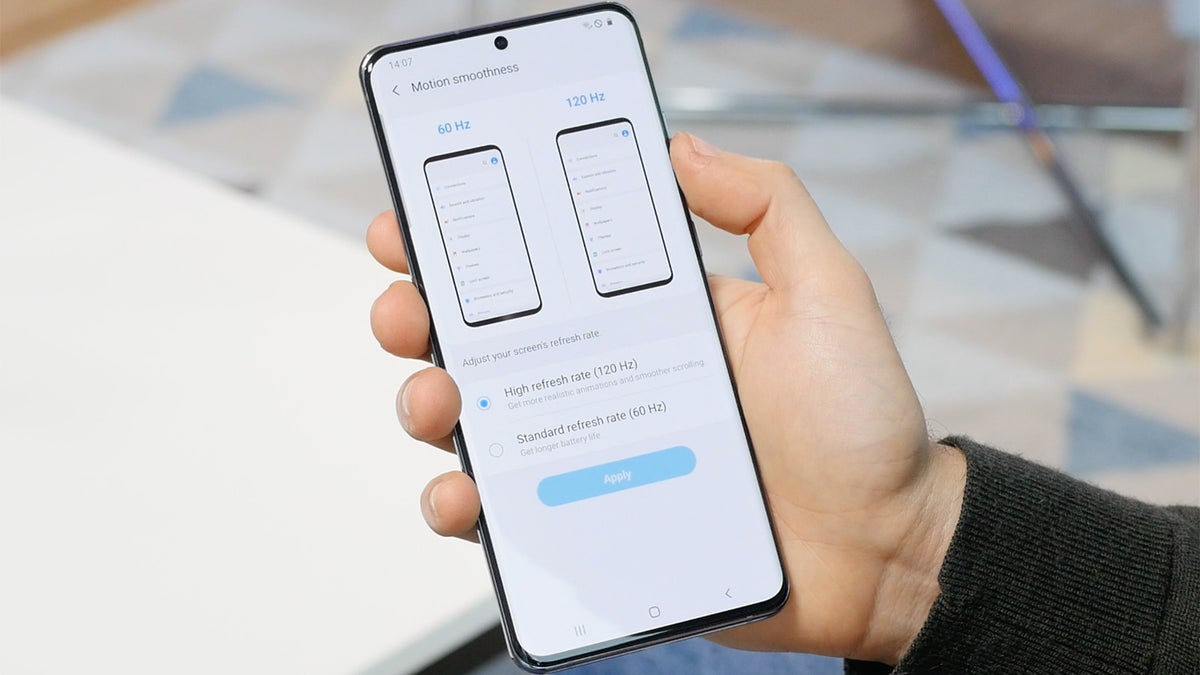Samsung Galaxy S20 Ultra: 120Hz vs 60Hz Battery Life Comparison

The Galaxy S20 Ultra comes with a special screen that can refresh twice as fast as a traditional smartphone display: it supports a 120-Hertz refresh rate (meaning it refreshes 120 times each second, compared to 60 times for traditional screens). But what effect does 120 Hertz have on battery life?
In this Galaxy S20 Ultra 120Hz vs 60Hz battery drain test, we compare the effect of the higher refresh rate on that massive, 5,000mAh battery inside Samsung's flagship for 2020.
We have already run a number of tests and one thing is clear: 120 Hertz does make a difference that you notice even when just navigating around the phone and browsing the web. The higher refresh rate will also be a huge benefit for gamers, allowing them faster reactions, but we tested a half a dozen games and none supported the new 120Hz option yet (support is promised to come soon, though).
The one area where you will not notice any difference with this new technology is in watching video. YouTube and most other platforms support video recorded in up to 60 frames per second (most of it is recorded in 30fps or 24fps), which would look perfectly smooth with a traditional 60 Hertz screen and the new 120 Hertz option will not make a difference.
With all of this in mind, to measure the battery life difference between a 120Hz experience vs a 60Hz one, we turn to our browsing battery test. Before we tell you the results, though, let us mention that we have the Exynos 990 version of the S20 Ultra and we are using the phone in the "Optimized" battery mode and the 1080p screen resolution (120Hz is not supported yet in the maximum 1440p resolution).
S20 Ultra 120Hz vs 60Hz Battery Drain Test Comparison
- Samsung Galaxy S20 Ultra 60Hz Battery Drain Test result: 12 hours 23 minutes
- Samsung Galaxy S20 Ultra 120Hz Battery Drain Test: 10 hours 2 minutes
- Samsung Galaxy Note 10 Plus: 11 hours 37 minutes
- Samsung Galaxy S10 Plus: 10 hours 33 minutes
- Apple iPhone 11 Pro Max: 12 hours 53 minutes
These results answer the question pretty unequivocally: yes, there is a BIG difference between 120Hz and 60Hz not just on how smooth the phone performs, but also on battery life.
At 60 Hertz, the S20 Ultra is among the very best phones when it comes to battery life, but if you switch to 120 Hertz, you get a battery score that is lower by 2 hours and nearly 20 minutes. That means you get nearly 20% worse battery life when you switch to 120 Hertz.
You get nearly 20% worse battery life if you use 120 Hertz
That is a considerable difference. At 60 Hertz, the S20 Ultra ranks among the longest lasting phones we have ever tested, but when you switch to 120 Hertz battery life falls so much that it will rank slightly above the middle of the charts. It's up to you to decide whether this trade off is worth it.
What this test also shows, however, is that at 60 Hertz, Samsung has managed to create a phone that is an absolute battery beast, delivering longer battery life than the Note 10+ and the S10+, but it falls just slightly short of the iPhone 11 Pro Max on the browsing test.
We will be testing the battery life on the S20 Ultra in a lot more detail and expect to see a proper battery comparison against other phones coming very soon!
Follow us on Google News














Things that are NOT allowed:
To help keep our community safe and free from spam, we apply temporary limits to newly created accounts: